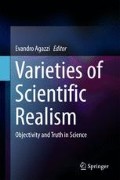Abstract
A couple of elementary ‘facts of life’ stimulate our reflection. The first is that “all humans want by their nature to know”, as Aristotle says at the beginning of his Metaphysics.
Access this chapter
Tax calculation will be finalised at checkout
Purchases are for personal use only
Notes
- 1.
A particularly clear declaration in this sense regarding one of the most advanced sciences of that time (astronomy) is expressed by Thomas Aquinas : “Though, if these suppositions are made, the appearances were saved, one should not say nevertheless that such suppositions are true, because possibly the appearances regarding the stars can be saved according to some other way not yet understood by humans” (Aquinas, De coelo et mundo, 2, 12, 17).
- 2.
See the following statement contained in the first letter to Marcus Welser on the solar spots: “The philosopher-astronomers, besides trying to save at any rate the appearances, try to investigate—as the greatest and most marvelous problem—the true constitution of the universe, since such a constitution exists, and it exists in a way which is unique, true, real, and impossible to be otherwise, and worth being put before any other knowable question by the speculative minds, owing to its greatness and nobility”. (Galilei, Opere V, p. 102).
- 3.
See the third letter to Marcus Welser in Galilei, Opere V, pp. 182–188).
- 4.
See for example Galilei, Opere VIII, pp. 202–203.
- 5.
Here is the celebrated text: “I have not as yet been able to discover the reason for these properties of gravity from phenomena, and I do not feign hypotheses. For whatever is not deduced from the phenomena must be called a hypothesis; and hypotheses, whether metaphysical or physical, or based on occult qualities, or mechanical, have no place in experimental philosophy. In this philosophy particular propositions are inferred from the phenomena, and afterwards rendered general by induction” (Newton 1726, Engl. transl., p. 943).
- 6.
See Sellars (1963).
References
Aquinas Th., In libros Aristotelis De caelo et mundo expositio, transl. by F. R. Larcher, Fabian R., and P. H. Conway, Exposition of Aristotle’s Treatise On the Heavens. 2 vols. Columbus, Ohio: College of St. Mary of the Springs, 1964. E-text, http://dhspriory.org/thomas/DeCoelo.htm.
Galilei G., Opere: Le opere di Galileo Galilei, Edizione Nazionale a cura di A. Favaro, Firenze, Barbera, 1929–1939; repr.1964–66, 20 vols.
Newton I., (1726), Philosophiae Naturalis Principia Mathematica. Engl. Transl. by B. Cohen and A. Withman, University of California Press, 1999.
Sellars W., (1963) Science, Perception and Reality, Routledge and Kegan Paul, London.
Acknowledgements
More than half of the chapters of this book are revised versions of invited papers presented at the Congress of the International Academy of Philosophy of Science (IAPS) held on September 23–25, 2015 at the University of A Coruña (Spain) on the theme Scientific Realism: The Problem of Objectivity and Truth in Science. The program of that conference was jointly prepared by Evandro Agazzi (President) and Wenceslao Gonzalez (Member) of the IAPS. A special thanks goes to the latter also for the impeccable organization of the meeting, and to the University of A Coruña and the Deputación of A Coruña for their financial support. Mario Alai (Member of the IAPS) has greatly helped in the editing of this volume.
Author information
Authors and Affiliations
Corresponding author
Editor information
Editors and Affiliations
Rights and permissions
Copyright information
© 2017 Springer International Publishing AG
About this chapter
Cite this chapter
Agazzi, E. (2017). Introduction: The Conceptual Knots of the Realism Debate. In: Agazzi, E. (eds) Varieties of Scientific Realism. Springer, Cham. https://doi.org/10.1007/978-3-319-51608-0_1
Download citation
DOI: https://doi.org/10.1007/978-3-319-51608-0_1
Published:
Publisher Name: Springer, Cham
Print ISBN: 978-3-319-51607-3
Online ISBN: 978-3-319-51608-0
eBook Packages: Religion and PhilosophyPhilosophy and Religion (R0)

